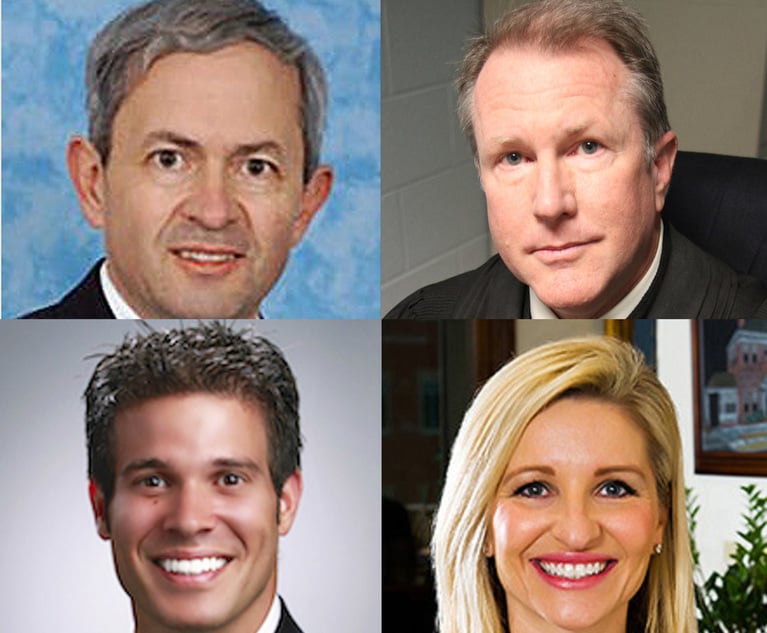Lifetime Achievement Award: Glen Reed
"Health care is a huge part of the society, and every point of view is found in health care. As a lawyer focused on solving problems and on helping health care clients succeed, one needs to be able to relate to all of that diversity."
June 28, 2018 at 02:34 PM
5 minute read
 Glen Reed, King & Spalding, Atlanta (Photo: John Disney/ALM)
Glen Reed, King & Spalding, Atlanta (Photo: John Disney/ALM)In the mid-1990s, Reed assisted many hospitals with the restructuring and integration with physician practices, including the first physician/hospital managed care network in Georgia—The Piedmont Clinic, which now has over 1,500 participating physicians and six hospitals.
He also was the principal architect of many other healthcare restructurings, mergers and integrations in Georgia.
Reed was a founding board member for MedShare International, which sends unused medical devices and supplies to developing countries. His family foundation raised funds for shipping of these goods overseas.
Here is our Q&A with Reed:
How did you become interested in health care law? It must have been very different when you started compared to what it's like today. On my first day in practice, I was assigned some work for a hospital management company. In the months that followed, there was more and more to be done for that client. The partner I was working for was a great lawyer, and much of the work involved unique health care industry laws and business arrangements. We did not think of health care law as an area of practice for several years, but eventually the area began to emerge, and the benefits of really learning and applying an industry approach became clear to us. Like all young lawyers in firms, I was trying to make myself as valuable as possible, and this looked like an area with strong long-term trends, where some unique capabilities could be developed. I also may have had a bit of a natural affinity for it, as my father was a dentist and my mother worked as a nurse and in the business side of my father's practice. You created your firm's annual Health Law & Policy Forum in the early 1990s, when health care was becoming a highly contentious partisan issue. Do health care lawyers need to stay out of the political debate to serve their clients best, or do they need to take sides? Sometimes advocacy is a contribution health care lawyers can make, but to be most effective at just practicing law, I think standing back from the partisan debates is usually best. Health care is a huge part of the society, and every point of view is found in health care. As a lawyer focused on solving problems and on helping health care clients succeed, one needs to be able to relate to all of that diversity. What do you expect health care law to look like in 10 years, especially with regard to a national plan like the Affordable Care Act or a replacement? In 10 years, I think we will see an extension of trends we have been experiencing for a long time in health care. In the law itself and in the clients' businesses, there will be more complexity, and that will drive more narrow specialization by a lot of people. The law will struggle to keep up with technological change, and lawmakers will not act fast enough. There also may be growth in health care law specialization in other countries, borrowing from our experience here. I think that the laws contained in the Affordable Care Act will just evolve, without any huge disruptions. What is one of your proudest accomplishments in the law, and what challenge did you have to overcome so you could achieve it? Aside from building the health care practice at King & Spalding, a proud moment was completing the merger of the National Health Lawyers Association and the American Academy of Healthcare Attorneys, to form the American Health Lawyers Association. I represented one of the prior organizations and had the primary responsibility for absorbing lots of input and proposing a transaction with elements that would provide a strong foundation for moving forward. The challenge was to satisfy most of the 47 lawyers on two boards of directors. The merger took, and the organization has over 12,000 members now, with over 200 from King & Spalding. What part of legal practice should young lawyers pay attention to, if they want to have success like you have in their careers? A client told me last month that I have been good at listening, at having a desire to learn and at not always trying to show how much more I know than the client does—so I guess that's one thing. I would advise young professionals of all types to take advantage of all the learning that is available now on human nature. Law practice in particular involves constant efforts to influence people and predict what people will do, so a better appreciation of what makes us all tick can be very valuable.
This content has been archived. It is available through our partners, LexisNexis® and Bloomberg Law.
To view this content, please continue to their sites.
Not a Lexis Subscriber?
Subscribe Now
Not a Bloomberg Law Subscriber?
Subscribe Now
NOT FOR REPRINT
© 2024 ALM Global, LLC, All Rights Reserved. Request academic re-use from www.copyright.com. All other uses, submit a request to [email protected]. For more information visit Asset & Logo Licensing.
You Might Like
View All
Eversheds Sutherland Moving After 36 Years to Smaller Atlanta Office
4 minute read
Population and Caseload Boom Birth New West Georgia Judicial Circuit
7 minute read
On The Move: Moore & Van Allen Adds to C-Suite, Cadwalader Promotes Three in Charlotte
4 minute read
Trending Stories
Who Got The Work
Michael G. Bongiorno, Andrew Scott Dulberg and Elizabeth E. Driscoll from Wilmer Cutler Pickering Hale and Dorr have stepped in to represent Symbotic Inc., an A.I.-enabled technology platform that focuses on increasing supply chain efficiency, and other defendants in a pending shareholder derivative lawsuit. The case, filed Oct. 2 in Massachusetts District Court by the Brown Law Firm on behalf of Stephen Austen, accuses certain officers and directors of misleading investors in regard to Symbotic's potential for margin growth by failing to disclose that the company was not equipped to timely deploy its systems or manage expenses through project delays. The case, assigned to U.S. District Judge Nathaniel M. Gorton, is 1:24-cv-12522, Austen v. Cohen et al.
Who Got The Work
Edmund Polubinski and Marie Killmond of Davis Polk & Wardwell have entered appearances for data platform software development company MongoDB and other defendants in a pending shareholder derivative lawsuit. The action, filed Oct. 7 in New York Southern District Court by the Brown Law Firm, accuses the company's directors and/or officers of falsely expressing confidence in the company’s restructuring of its sales incentive plan and downplaying the severity of decreases in its upfront commitments. The case is 1:24-cv-07594, Roy v. Ittycheria et al.
Who Got The Work
Amy O. Bruchs and Kurt F. Ellison of Michael Best & Friedrich have entered appearances for Epic Systems Corp. in a pending employment discrimination lawsuit. The suit was filed Sept. 7 in Wisconsin Western District Court by Levine Eisberner LLC and Siri & Glimstad on behalf of a project manager who claims that he was wrongfully terminated after applying for a religious exemption to the defendant's COVID-19 vaccine mandate. The case, assigned to U.S. Magistrate Judge Anita Marie Boor, is 3:24-cv-00630, Secker, Nathan v. Epic Systems Corporation.
Who Got The Work
David X. Sullivan, Thomas J. Finn and Gregory A. Hall from McCarter & English have entered appearances for Sunrun Installation Services in a pending civil rights lawsuit. The complaint was filed Sept. 4 in Connecticut District Court by attorney Robert M. Berke on behalf of former employee George Edward Steins, who was arrested and charged with employing an unregistered home improvement salesperson. The complaint alleges that had Sunrun informed the Connecticut Department of Consumer Protection that the plaintiff's employment had ended in 2017 and that he no longer held Sunrun's home improvement contractor license, he would not have been hit with charges, which were dismissed in May 2024. The case, assigned to U.S. District Judge Jeffrey A. Meyer, is 3:24-cv-01423, Steins v. Sunrun, Inc. et al.
Who Got The Work
Greenberg Traurig shareholder Joshua L. Raskin has entered an appearance for boohoo.com UK Ltd. in a pending patent infringement lawsuit. The suit, filed Sept. 3 in Texas Eastern District Court by Rozier Hardt McDonough on behalf of Alto Dynamics, asserts five patents related to an online shopping platform. The case, assigned to U.S. District Judge Rodney Gilstrap, is 2:24-cv-00719, Alto Dynamics, LLC v. boohoo.com UK Limited.
Featured Firms
Law Offices of Gary Martin Hays & Associates, P.C.
(470) 294-1674
Law Offices of Mark E. Salomone
(857) 444-6468
Smith & Hassler
(713) 739-1250






